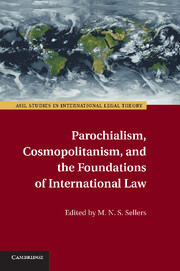Book contents
- Frontmatter
- Contents
- Notes on Contributors
- Preface
- 1 Introduction
- 2 Parochialism and the Legitimacy of International Law
- 3 Parochialism, Cosmopolitanism, and the Paradigms of International Law
- 4 Liberal Cosmopolitanism or Cosmopolitan Liberalism?
- 5 Are Human Rights Parochial?
- 6 The Parochial Foundations of Cosmopolitan Rights
- 7 Rights in Reverse
- 8 Parochial Restraints on Religious Liberty
- 9 Parochialism, Cosmopolitanism, and Justice
- Index
- References
6 - The Parochial Foundations of Cosmopolitan Rights
Published online by Cambridge University Press: 05 December 2011
- Frontmatter
- Contents
- Notes on Contributors
- Preface
- 1 Introduction
- 2 Parochialism and the Legitimacy of International Law
- 3 Parochialism, Cosmopolitanism, and the Paradigms of International Law
- 4 Liberal Cosmopolitanism or Cosmopolitan Liberalism?
- 5 Are Human Rights Parochial?
- 6 The Parochial Foundations of Cosmopolitan Rights
- 7 Rights in Reverse
- 8 Parochial Restraints on Religious Liberty
- 9 Parochialism, Cosmopolitanism, and Justice
- Index
- References
Summary
[I]nternational human rights are not the work of philosophers, but of politicians and citizens.
Introduction
Louis Henkin titled a collection of his essays published in 1990 The Age of Rights. Although it turned out to be a prescient description of what international law was to become in the next decade and a half, it was hardly an accurate description of the international order into which the book was launched. The previous year had witnessed the fall of the Berlin wall, but its ramifications for human rights were, in 1990, uncertain. In contrast, there was no denying the completeness of the destruction of “rights” that had occurred in Tiananmen Square. The Age of Rights had not been written with either of these two events in mind, however, nor was it necessarily crafted to explore the emerging policies of glasnost in the Soviet Union. In some ways, the title seemed misplaced against the backdrop of the privations of famine, hunger, ill health, imprisonment, and outright death flowing from responses to World Bank– and International Monetary Fund–imposed “structural adjustment programs” in Africa and Latin America; the large-scale deprivations of life (and other atrocities) in Lebanon, the Palestinian camps, and the wars of Central America, all of which featured prominently in the news stories of the 1980s. Rather, most of the essays in the collection had been written primarily against the backdrop of an emerging trend in the United States to treat “international human rights” less as a moral engagement, and more as a legal and political tool. The successful inclusion in the Helsinki Declaration of the recognition by states that the claims of their citizens to more or less free movement was a matter of international concern, and the enshrining of this philosophy in United States trade policies had given “rights” a new salience in international diplomacy.
Illustrative of this emerging philosophy of rights is a signal essay in the collection: “Rights: American and Human.” Initially published in a law journal in 1979, Henkin devoted as much time in this essay explicating the concept of “rights” enshrined in the American Declaration of Independence and the American Constitutional order as he did elaborating on claims about the nature and sources of international human rights. The purpose was to identify and associate American parochial conceptions of Constitutional rights with the international rights embodied in the Universal Declaration of Human Rights (UDHR).
- Type
- Chapter
- Information
- Publisher: Cambridge University PressPrint publication year: 2011
References
- 1
- Cited by



